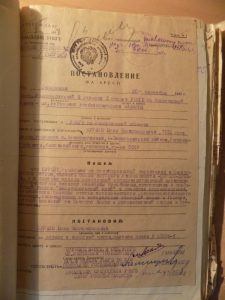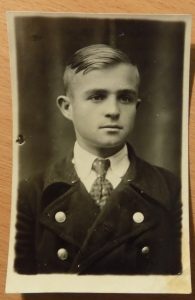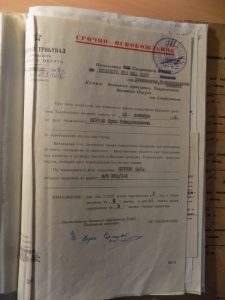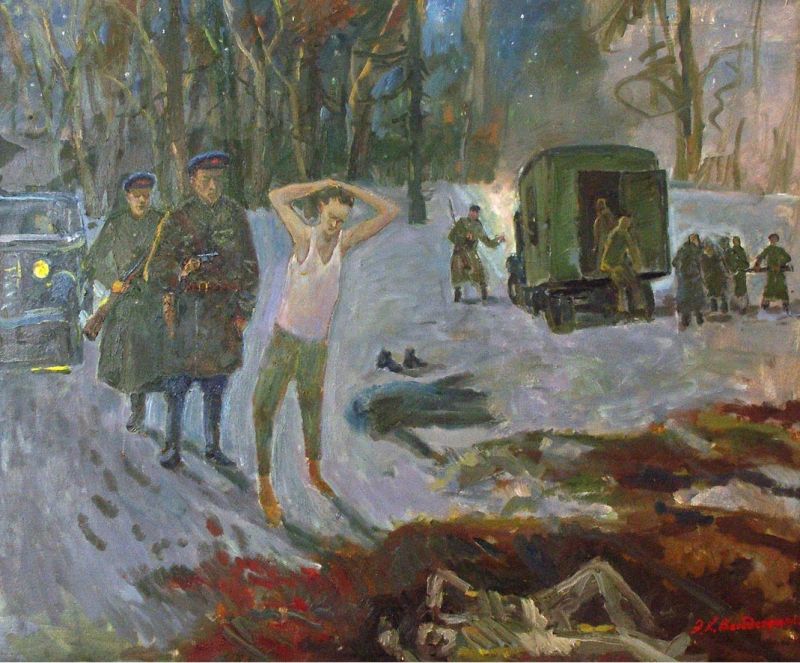The archives are indeed changing national memory and allowing more and more Ukrainian citizens to learn what really happened to their family members under the repressive years of Stalin, the NKVD and the KGB.
Here is one tragic story of Soviet repression against a group of patriotic Ukrainian youngsters in the 1940s.
Twenty years of hard labour - for the young man, ten years in a penal colony - for the young girls. This is how Soviet authorities dealt with the members of the youth branch of the Organization of Ukrainian Nationalists (OUN) in Melitopol Raion, Zaporizhzhia Oblast.
In January 1945, the Soviet secret service arrested 20-year-old Yuriy Kurylo
, who was serving on the front lines with the Red Army at that time. There were several reasons for the arrest, the main ones being belonging to a family of “traitors to the Motherland”, namely Yuriy’s father Ilarion Kurylo-Krymchak, member of the Melitopol Organization of Ukrainian Nationalists, and Yuriy’s active participation in the OUN youth movement.

During the German occupation of Zaporizhzhia Oblast, Mykhailo Vintoniv (call sign “Mykhas”), one of the organizers and leaders of the underground OUN movement in Melitopol region, was a frequent guest at the Kurylo family home. It was from him that Yuriy Kurylo received many books and leaflets and learned about the OUN fight for the independence of Ukraine.
In 1942, 17-year-old Yurko joined the OUN movement. His main mission was to conduct and organize meetings among his peers and involve them in patriotic activities.

An OUN Youth Centre was established at the Melitopol Agricultural College. It functioned under the guise of a Ukrainian-speaking club called “Kozaky” (Cossacks), which was created to counter the Russian-speaking group “Dony”. Not all the members of “Kozaky” were active in the OUN underground movement. Some were simply Ukrainian-speakers who got together socially, others wrote poems for the magazine “Ukrayinsky Kolos” (Ukrainian Sheaf of Wheat).
After the Soviets returned to Melitopol, state security officers did not understand such nuances and proceeded to interrogate and then arrest all the active “Kozaky” as members of the OUN.
Yuriy Kurylo created another OUN youth centre in his native village of Voznesenka, not far from Melitopol. He convinced many of his peers to join the group, including Nina Lishchyna and Liubov Taranenko. The members were eager to learn: they read the literature they received from Vintoniv, in particular, books about Symon Petliura, Yevhen Konovalets, Stepan Bandera and the Decalogue of the Ukrainian Nationalist. By and large, no other political activities were conducted at the Centre.

Nevertheless, the Soviet state security authorities diligently and systematically liquidated the Voznesenivsky branch of the OUN youth movement. In the first months of 1945, Yuriy Kurylo, Nina Lishchyna and Liubov Taranenko were arrested and accused of treason and anti-Soviet propaganda.
The trial took place on April 16, 1945. All three youngsters were found guilty and sentenced to different terms of imprisonment by the NKVD Military Tribunal of Zaporizhzhia Oblast. Yuriy Kurylo was sentenced to twenty years of hard labour, stripped of his civil rights for five years and all his property was confiscated. Nina Lishchyna and Liubov Taranenko were sentenced to ten years in a penal colony and deprived of all civil rights for five years. The sentences were not subject to appeal.
After Stalin’s death in August 1954, the case of the OUN Youth Centre in Melitopol was reviewed by a senior KGB investigator in Zaporizhzhia Oblast. No attenuating circumstances were found. The following year, Yuriy Kurylo himself sent an appeal to the authorities. In some ways he was “lucky” – the sentence of twenty years’ hard labour was shortened to ten years in a penal colony. As the young man had already served ten years by 1955, he was eventually released.
Soon after Stalin’s death, the Soviet government launched the rehabilitation process, a procedure by which the Soviet regime tried to reclaim public confidence and legitimacy after having destroyed, through execution, imprisonment, deportation and exile, millions of innocent people. The relatives of the convicted members of the Voznesenivsky OUN Youth Centre appealed to the KGB. However, as of December 1990, all three were still considered criminals.

The three youngsters were finally rehabilitated in July 1991, just a month before Ukraine declared its independence on August 24, 1991.





